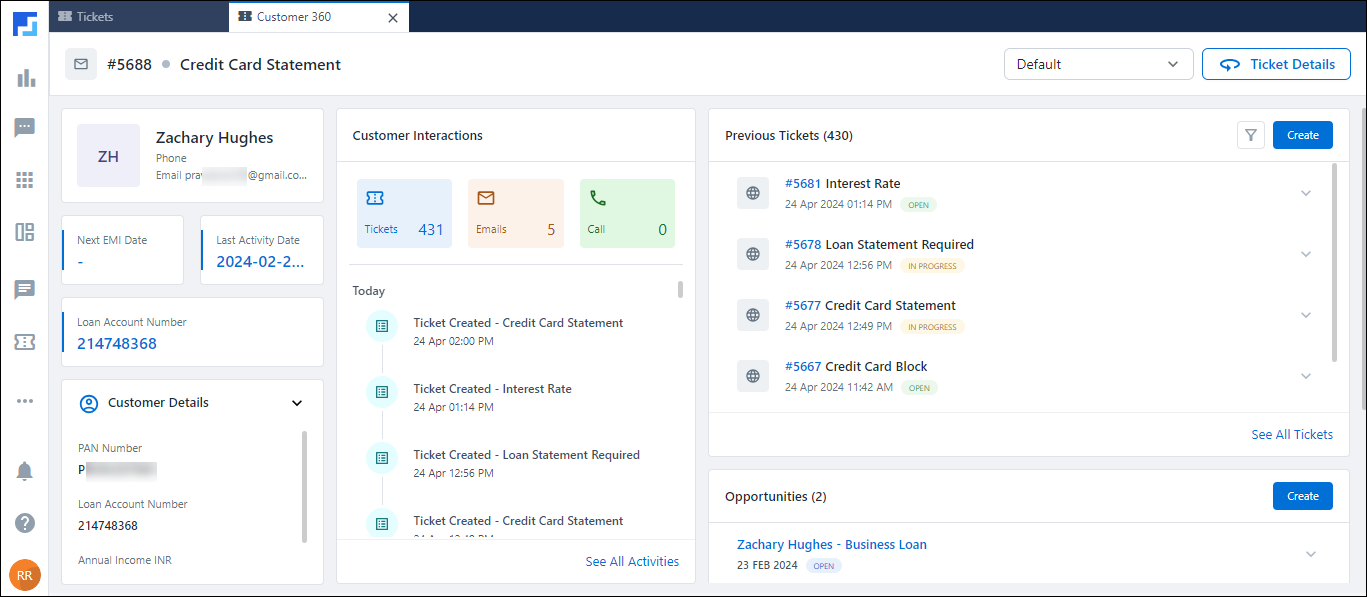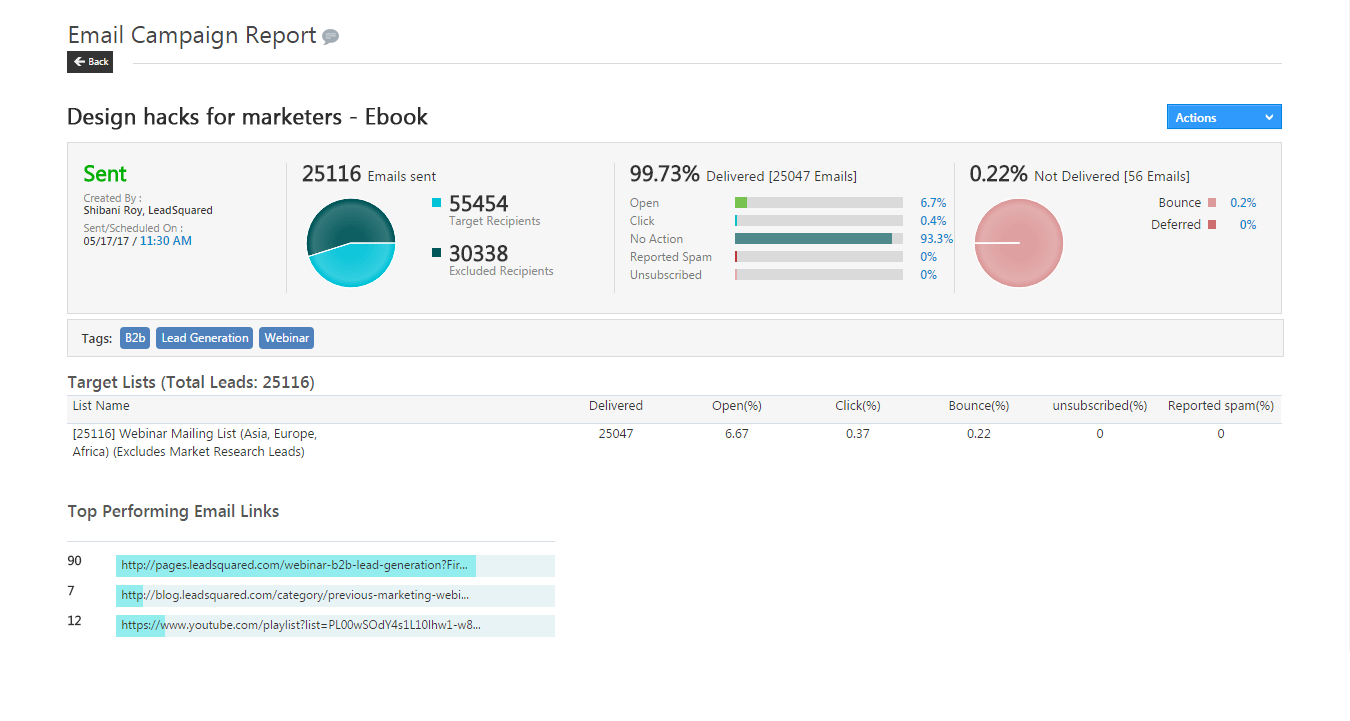Are you thinking of scaling up your business with Operational CRM?
Confused if Operational CRM is necessary for your business?
Let us help you be your own judge and decide if CRM is necessary by taking you through this blog, which explains everything you need to know about operational CRM.
What is Operational CRM?
An operational CRM is a software designed to reduce the time you need to spend on repetitive business tasks through automation. It helps businesses streamline day-to-day interactions between the business and its customers. Most importantly, it focuses on automating and improving sales, marketing, and customer service processes.
Say, for example, you run an automobile company:
- Your sales team targets customers who prefer white cars
- Your marketing team is promoting blue cars
- Your customer service team is helping clients with red cars.
Here, your teams waste a lot of their time, effort, and, most importantly, money.
This can be changed if your business has an operational CRM. You can connect all the teams and align their goals- making the selling and marketing process more efficient.
Benefits of Operational CRM
Customer satisfaction and loyalty
Operational CRM offers personalized customer interactions. When a customer is tended to according to their individual preference, the chances of them staying loyal are more.
LeadSquared CRM centralizes customer data- purchase history, preferences, interactions, and demographics. This helps businesses understand their customers.
Coming back to the example of the automobile business. Here, with centralized data the service team will know that the customer who raised a query has purchased a white car. Knowing the complaint even before the customer has to explain it – now that is customer service.
Similarly, all the teams can work on the same type of car instead of promoting three different things. This increases the outcome and saves resources.
In addition, operational CRM streamlines customer inquiries, complaints, and issues. This helps the customer service team to resolve problems efficiently.

When integrated with communication channels and automated workflows, Operational CRM sends inquiries to the appropriate team member.
You can track customer issues from initiation to resolution, promising quick and efficient issue resolution.
Improves sales and marketing effectiveness
Operational CRM uses customer data to create relevant and impactful targeted marketing campaigns.
It tracks customer behavior, such as website visits, email opens, and social media interactions. This allows precise targeting based on actual customer interaction.
LeadSquared CRM captures leads from various sources – landing pages, forms, events, and social media. These leads are automatically assigned to sales representatives based on priority.
The progress of these leads can be tracked through the sales funnel, ensuring that leads are followed up and nurtured properly.
Operational CRM provided visibility into the sales pipeline by allowing the sales team to:
- Track opportunities in real-time
- Record calls and interactions
- Notify if scheduled calls are missed
- Know the status update
- View the prospect’s next step
This visibility into the sales pipeline helps managers allocate resources effectively and prioritize high-potential customers.
Streamline business processes
Operational CRM is crucial in streamlining business processes through automated workflows and centralized customer data.
You can automate data entry, follow-up emails, task assignments and more. This reduces manual effort, allowing employees to focus on important tasks that need immediate attention.
This increases overall team performance and reduces operational costs.
Operational CRM analyses workflow data to identify bottlenecks and inefficiencies.
It centralizes customer information into a single database that can be accessed by authorized employees. This offers certain advantages to the entire team:
- 360-degree view – Operational CRM centralizes customer data from multiple touchpoints – sales, marketing, and customer service. This way, all the teams can be on the same page and increase team efficiency.
- Data consistency – With centralized customer data, all departments can access up-to-date information.
Use Cases of Operational CRM
Sales force automation
Sales force automation focuses on optimizing and automating the sales process – lead capturing to opportunity management.
Here is how sales force automation can improve your sales process:
Lead management and tracking
Sales force automation streamlines lead management by capturing leads from different sources- website, social media, google, lead providers, referrals, etc, and tracks their progress through the sales funnel.
LeadSquared CRM autoqualifies leads based on pre-defined rules. You can assign lead scores based on the lead’s action – emails opened, website visits, link clicks, etc.
You can distribute leads collected with your team based on priority, requirement, and pre-defined criteria.
It supports lead nurturing by automating personalized follow-ups based on lead behavior and interests.
Opportunity management
SFA tools can track the status of each sales opportunity – including stages in the sales cycle, interactions with prospects, and follow-up steps.
It provides visibility into the sales pipeline, including the number and value of opportunities at each stage.
With smart views, you can focus on the most important tasks first. This increases efficiency and makes prospect interaction fast and relevant.
Customer service management
Customer service management focuses on delivering efficient and effective customer support. This ensures customer loyalty and satisfaction.
Case management and escalation
Operational CRM can capture customer complaints, inquiries, and requests through various channels- phone calls, emails, social media, landing pages, forms, etc.
It prioritizes cases based on urgency, impact on the customer, and pre-defined rules.
You can integrate sales, marketing, and support interactions to create a detailed customer profile. These profiles can later be used to personalize customer support and enhance satisfaction.
You can configure inbound call flows for effective issue prioritization and resolution.
Marketing automation
Marketing automation helps businesses manage campaigns and engage with audiences. This helps the business gain more loyal customers.
Campaign management and tracking
Operational CRM allows businesses to plan and organize marketing campaigns across multiple channels – email campaigns, social media, landing pages,etc .
You can automate the execution of marketing campaigns based on predefined triggers or schedules.
Operational CRM uses customer data to personalize marketing messages and content according to customers’ preferences.
With campaign tracking and analytics, CRM can track key performance metrics for each marketing campaigns such as open rate, click-through rate and ROI.

Customer segmentation and targeting
Operational CRM uses customer data to segment audiences based on various criteria like demographics, behavior, purchase history, complaints, and engagement patterns.
Segmented customer groups receive targeted messages and offers tailored to their unique needs and interests based on their preferences.
LeadSquared CRM automates segmentation by applying the required criteria to customer data.
For example, say you own a clothing brand, and a marathon is happening soon in a nearby locality. You can segment the customers who often buy athletic wear and send them targeted ads related to running shoes and gear.
Best Tools for Operational CRM
LeadSquared
Features and Benefits:
- Lead Management: With LeadSquared, you can capture leads from various sources, track their journey through the sales funnel, and prioritize them based on engagement and behavior.
- Marketing Automation: To nurture leads, you can effectively plan, execute, and measure marketing campaigns across multiple channels.
- Sales Automation: Streamline sales processes with tools for pipeline management, automated workflows, and task assignment.
- Customer Service CRM: Manage customer inquiries, issues, complaints, and support tickets with case management features. Centralize customer interactions for efficient resolution and enhanced customer satisfaction.
Pricing Options:
Pricing details are available upon request.
Salesforce
Features and Benefits:
- Comprehensive CRM: Includes modules for sales, service, marketing, and commerce to manage the entire customer lifecycle.
- Customization: Salesforce is a customizable platform with AppExchange that integrates third-party apps and customizes functionalities.
- Community and Support: Extensive community support, resources, and user training options.
- Scalability: Scales from small businesses to large enterprises with customizable solutions.
Pricing Options:
Salesforce provides different pricing options for various business needs. Click here for pricing details.
Zoho CRM
Features and Benefits:
- 360-Degree View: Zoho CRM Centralizes customer data to provide a complete view of customer interactions across sales, marketing, and customer support.
- Automation: Automates repetitive tasks, workflows, and email marketing campaigns for increased efficiency.
- Mobile App: Allows remote teams and field sales access to CRM features on the go.
- Integration: Integrates with Zoho’s suite of business applications and third-party tools for enhanced functionality.
Pricing Options:
- Standard: Starts at $14 per user per month.
- Professional: Starts at $23 per user per month.
- Enterprise: Starts at $40 per user per month.
- Ultimate: Starts at $52 per user per month.
Key Consideration for Choosing an Operational CRM Tool
When choosing an operational CRM tool for your business, several key considerations should guide your decision-making process:
- Scalability and Customization Options—Make sure that the CRM you choose can accommodate increasing data volumes, users, and customer interactions as your business grows.
- Integration Capabilities with Existing Systems—When choosing an operational CRM tool, Check compatibility with your current IT infrastructure and other business platforms.
LeadSquared CRM can be easily integrated with other tools such as WhatsApp business API, analytics, email, chat, telephony, payment gateways, meeting schedulers, etc.
- User-Friendly Interface and Ease of Use – Select a CRM tool with an intuitive interface that is easy for your team to navigate and use effectively.
You can also depend on free trials to see if the features align with your business needs. Book a free trial today! Click here.
- Data Security and Privacy Measures—Always prioritize platforms that adhere to industry-standard security protocols (like encryption, access control, data masking, etc.).
Conclusion
In conclusion, operational CRM helps increase business efficiency and customer satisfaction. It helps the team by automating and streamlining sales, marketing, and customer service processes.
By centralizing customer data and interactions, businesses can work as a team towards the same goal. With this information businesses can personalize customer engagement and create targeted marketing campaigns.
Investing in the right CRM software helps businesses. It streamlines operations and improves data-driven decisions. This leads to sustainable growth and enhances customer relationships. Ultimately, it creates experiences that foster loyalty and connection.









